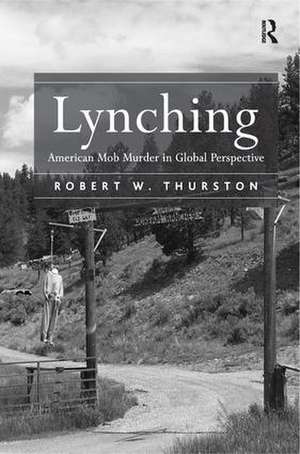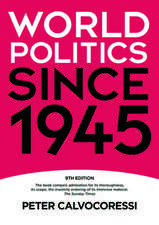Lynching: American Mob Murder in Global Perspective
Autor Robert W. Thurstonen Limba Engleză Hardback – 28 feb 2011
| Toate formatele și edițiile | Preț | Express |
|---|---|---|
| Paperback (1) | 267.41 lei 43-57 zile | |
| Taylor & Francis – 14 oct 2024 | 267.41 lei 43-57 zile | |
| Hardback (1) | 1072.08 lei 43-57 zile | |
| Taylor & Francis – 28 feb 2011 | 1072.08 lei 43-57 zile |
Preț: 1072.08 lei
Preț vechi: 1307.42 lei
-18% Nou
Puncte Express: 1608
Preț estimativ în valută:
205.15€ • 214.73$ • 170.74£
205.15€ • 214.73$ • 170.74£
Carte tipărită la comandă
Livrare economică 31 martie-14 aprilie
Preluare comenzi: 021 569.72.76
Specificații
ISBN-13: 9781409409083
ISBN-10: 1409409082
Pagini: 442
Dimensiuni: 156 x 234 x 25 mm
Greutate: 0.95 kg
Ediția:1
Editura: Taylor & Francis
Colecția Routledge
Locul publicării:Oxford, United Kingdom
ISBN-10: 1409409082
Pagini: 442
Dimensiuni: 156 x 234 x 25 mm
Greutate: 0.95 kg
Ediția:1
Editura: Taylor & Francis
Colecția Routledge
Locul publicării:Oxford, United Kingdom
Public țintă
Academic and PostgraduateNotă biografică
Robert W. Thurston, Miami University, Ohio, USA
Cuprins
Introduction; I: What is Lynching?; I 1: The Processes of Lynching Around the World; I 2: The Roots of Mob Murder: Crises of Legitimacy, Dangers of the Frontier; I 3: Concepts of Crime and Justice in Lynching; II: Lynching and Cultural Change: Images of Sex, Savages, and Women; II 4: Race, Civilization, and Sexuality: A Global Conversation; II 5: Recordering Racism: Imperialism and the Challenges of New Contact in the Nineteenth Century; II 6: The Body Revealed in the Anglo-American World, 1885–1914; III: Blood, Debate, and Redemption in Georgia: The Path toward Reform; III 7: The World of Southern Racism: The Long Education of a Georgia Gentleman; III 8: Atlanta in Turmoil: The White Elite Reacts to Murder; III 9: From Burning Women to Protest and Action; III: Conclusion: The Difficulty of Seeing Lynching
Recenzii
'Recommended.' Choice 'Thurston’s most interesting contribution is to widen our angle on lynching to a global perspective by examining mobs and popular violence in Indonesia, Russia, Nigeria, India, Guatemala, and elsewhere... by bringing the story to our times Thurston challenges simple-minded but popular notions of the ubiquitous lynch noose and the manner in which they enable some Americas to take comfort in one-dimensional stories of hate and guilt.' American Historical Review 'Thurston pushed against the conventional wisdom that collective murder remained an American phenomenon by crafting a synthetic history of lynching and placing it in a global context... [Thurston] excels in exploring Anglo-American thought and practice regarding extralegal justice from the colonial through the antebellum period. His work will be of great interest to students of early American legal culture and its temporal and regional variations.' Journal of Southern History 'This is an extraordinarily rich study, to which a brief review such as this can do scant justice. Its revisionist interpretation of lynching will be relevant to the work of historians of a wide range of national interests.' The Historian
Descriere
Addressing one of the most controversial and emotive issues of American history, this book presents a thorough re-examination of the background, dynamics and decline of American lynching. It argues that collective homicide in the US cannot be properly understood solely through a discussion of the unsettled southern political situation after 1865, but must be seen against a global conversation about changing cultural meanings of 'race', as well as concepts of imperialism, gender, sexuality and 'civilization'.












